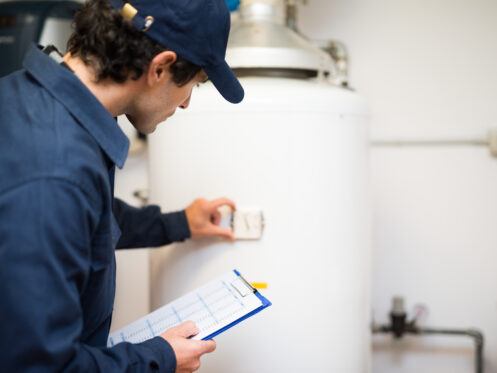It is crucial to determine the optimal temperature for a water heater when relocating or upgrading an existing one. How hot is too hot for a water heater to handle? Discover the ideal temperature setting for your water heater to ensure optimal performance, whether avoiding excessively low or scorchingly hot temperatures.
Manufacturer’s Settings
Right out of the large box, each tank water heater has a thermostat set at a certain temperature. These temperatures depend on what the manufacturing company recommends and are usually set at 120 degrees Fahrenheit or 140 degrees Fahrenheit. However, this does not indicate that the temperature setting is the best selection for your home.
Ideal Water Temperature Settings
The ideal temperature is 120 degrees Fahrenheit because it slows the progression of corrosion and sediment production and is a safe temperature to prevent scalding injuries. Temperatures under 120 degrees can be too cold, especially on the far side of the home and during colder weather. However, temperatures over 120 degrees Fahrenheit risk scalding skin and increase the tank’s corrosion rate and calcium deposits in your piping.
Factors Affecting Water Heater Temperatures
There are a few reasons why you would want your water heater temperature to be lower and closer to around 120 degrees. Electric water heaters can use more energy to keep the tank water warm, especially if the tank lacks proper insulation against heat loss. Lower temperatures also assist in expanding the lifespan of your water heater when coupled with annual maintenance by a service professional. While many adults enjoy higher temperatures in their showers, baths, and cleaning appliances, lower temperatures protect children in the home from hot water injuries.
There is also a benefit from setting the temperature at a higher temperature, including reducing the growth of germs and reducing the amount of energy that heating appliances like a washer and dishwasher must create. If your water heater is gas and not electric, there are no children in the home, and you get your plumbing serviced regularly, a higher water temperature is acceptable. Just remember that the higher the temperature, the more energy goes into keeping the water hot, and the risk of creating more sediment increases, reducing the lifespan of your water heater.
What About Changing the Thermostat in Different Seasons?
Seasonal outdoor temperature changes can affect the temperature of the water reaching your tap from the water heater. Ask a professional about scheduling spring and fall maintenance on your water heater to adjust the temperature, ensure the insulation is intact, and flush out the tank. Seasonal or annual maintenance will help spot indications of the tank rusting, parts starting to break, and insulation that might need replacing before it becomes a problem.
When you have an inspection done in spring, changing the temperature to 120 degrees Fahrenheit is ideal, especially when the weather begins to warm up. Hot weather might slightly increase the water temperature if pipes are above ground, not properly insulated, and the distance between the water heater and the tap is long. Reversely, when fall arrives, the length, open air, and lack of insulation can quickly decrease the temperature in the water before it reaches the tap. For fall maintenance, bumping up the water heater temperature may assist in keeping the water warm in these situations.
What Is the Best Water Heater Temperature?
When it comes down to choosing the best water heater temperature for your home, it comes down to preference, house build, energy use, and water heater maintenance and lifespan requirements. Keeping water hotter can assist with many mental and physical health benefits but negatively affect gas and electricity usage. When determining the recommended temperature for your home’s water heater, a professional will consider the age and number of the occupants, the height of the under-house crawlspace, the build of the house, and typical seasonal weather patterns.
While there are benefits and negatives to keeping your water heater’s thermostat lower or higher, the answer to the best water heater temperature is simply the temperature you choose. Recommendations state that the temperature should be no lower than 120 and no higher than 140 degrees Fahrenheit.
Contact TYCO Plumbing to learn more about water heater temperature settings if you live in the Brighton, CO area. We offer plumbing repair, installation, and drain cleaning services. We also offer gas piping.



